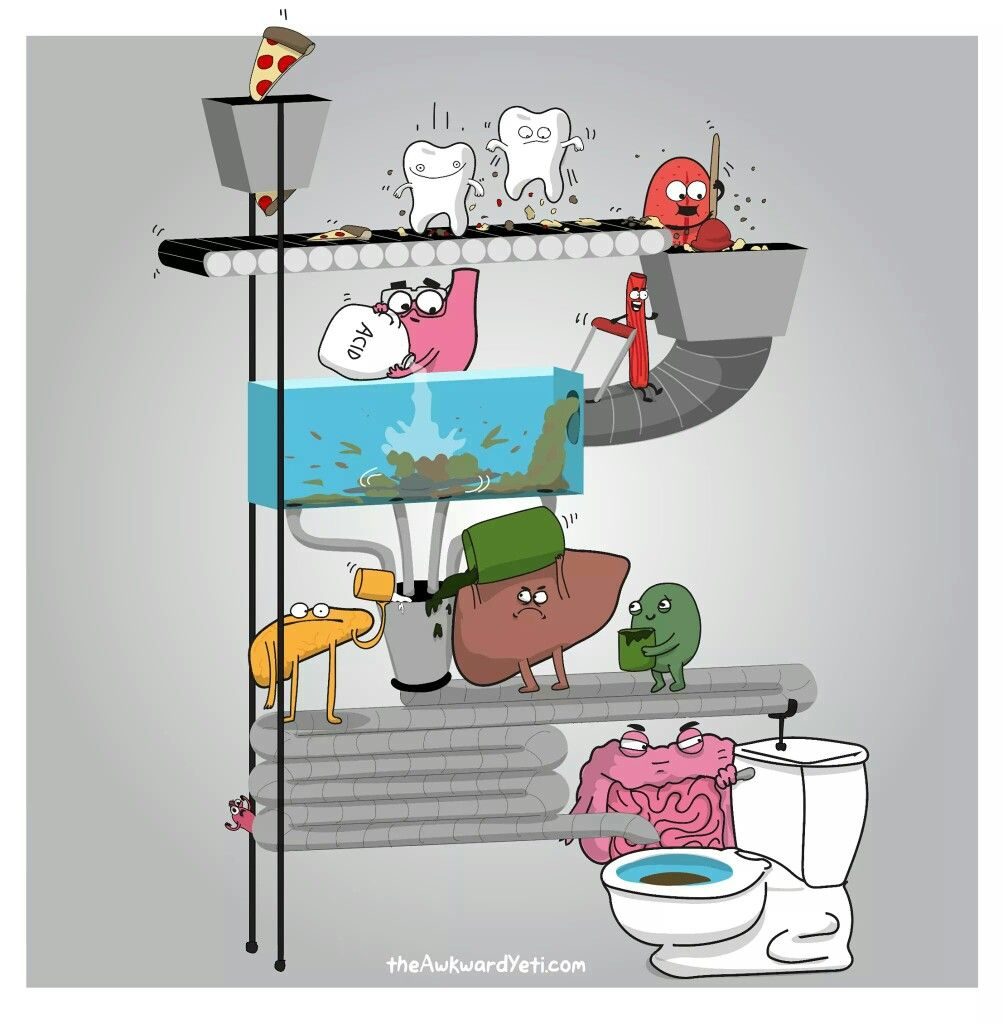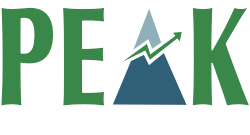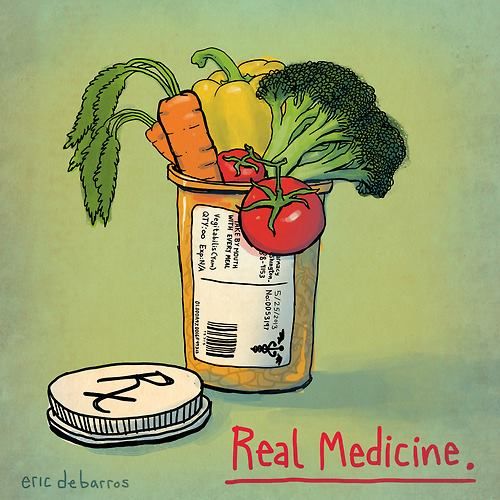
Ok – so Hippocrates may have been a bit of a drama queen, but he was certainly no dummy! The reality is that poor digestion really does affect our health on all levels. If we can’t digest the food we ingest, we won’t absorb its nutrients and every cell of every tissue of every organ in our bodies relies on those nutrients for proper structure and function. “But how do I know if I’m properly digesting my food” you ask? Burping, upset stomach, heartburn and reflux, gas and bloating, diarrhea, constipation…these are NOT normal! These are your body’s way of letting you know that the digestive train has run off the track. Ignoring or putting a bandaid disguised as an antacid over them will only lead to bigger issues in the future. Let’s take the journey and see exactly where and how that train jumped the track.
Just as the route of proper digestion travels north to south, so too does the dysfunction. Let’s start with the brain then. If you were so kind as to read my last post all the way through (insert applause here), you’ll remember that digestion only occurs when we are in a relaxed state. Stress completely shuts down digestion. Think about it, if you’re being chased by a bear (admittedly, a pretty stressful situation), do you want your brain sending messages telling the digestive system to organize the breakdown of the berries and deer meat you just consumed? Or do you want it to ignore that stuff and send those resources to your heart, lungs and muscles to give you the energy to get the heck out of there!?! The brain, as amazing as it is, cannot differentiate between the stress of a bear attack and the stress of our modern lives. So when you are grabbing breakfast on your way out the door, eating dinner while stuck in traffic on the way to the ball game, working through lunch or mindlessly shoving popcorn down while watching Game of Thrones…you probably aren’t digesting. Just for kicks, let’s carry on with the journey.

Everyone can remember at some point in their lives being told (usually by mom or grandma) that you need to “slow down and chew your food”. Rather than just a devious plan to make family mealtime even longer, it was valid advice! Food should be chewed for about 30 seconds before swallowing. Without proper chewing, the brain does not receive the message to trigger digestive processes and the production of saliva. Without enough saliva, the breakdown of carbohydrates does not begin in the mouth and cannot be completed further down the line in the small intestine. So we end up with undigested carbohydrates entering the colon, feeding candida (yeast) and generally disrupting the balance of microbes in our gut (dysbiosis).
We now arrive at the stomach. The stomach is all about that stomach acid. The acid in the stomach is our first line of defence against any little nasties (bacteria, parasites, viruses) that we may ingest. Without enough stomach acid, these organisms can thrive and proliferate, wreaking havoc on our G.I. tract. Digestive issues in the stomach most often stem from too little stomach acid. You read that right. The heartburn, reflux, bloating many experience is caused by TOO LITTLE ACID. I know you are thinking “what about all those people who have to take antacids every day because they have TOO much stomach acid?” The reality is that producing too much stomach acid, a condition known as Zollinger-Ellison syndrome, is very rare and affects only about 1 in every 1 million people (https://www.niddk.nih.gov/health-information/digestive-diseases/zollinger-ellison-syndrome). The majority of us have too little stomach acid (HCl) and its production is inhibited by things such as stress, excess carbohydrate consumption, alcohol and certain nutrient deficiencies. But how can we experience such discomfort and burning if we don’t have enough acid? Let’s take a look. When there is not enough acid in the stomach, food does not get broken down. This undigested food sits in the stomach and start to degenerate. Carbohydrates ferment, proteins putrefy and fats rancidify. Sounds lovely, no? This produces gas and increased pressure in the abdomen causing a backward flow into the esophagus. The lining of the esophagus was not intended to be exposed to acidic conditions so, even though the amount of acid in the stomach is too low for proper digestion, it will still burn the heck out of the unprotected lining of the esophagus.
Compounding the problem, the pyloric sphincter – or doorway – to the small intestine does not want to open because the chyme in the stomach is not at the right acidity. This further potentiates the degradation, gas and pressure build up. Eventually the sphincter releases allowing the contents into the small intestine. The acidity of the chyme is not low enough to trigger the release of the pancreatic juices containing sodium bicarbonate and pancreatic enzymes. Without the sodium bicarbonate, the chyme remains too acidic for the tender tissues of the small intestine and duodenal ulcers can occur. Pancreatic enzymes, which complete digestion, can only work at a higher pH. Their activity is impeded in this acidic environment and we now have large molecules of food impacting those little villi and microvilli of the small intestine. This, essentially, punches “holes” in the lining of the small intestine causing LEAKY GUT SYNDROME. With the integrity of this membrane compromised, large molecules of protein and fats can pass through and activate the immune system. (Your immune system sees these large molecules as foreign).
The maldigested foods then pass on to the large intestine where they continue to degenerate. This disrupts our healthy gut flora and causes a weakening of the cells of the colon. This can cause inflammation, loss of tone and contribute to a myriad of intestinal health issues.
You can see how just one imbalance (low stomach acid) can lead to a snowballing cascade of digestive issues. I haven’t even touched on the effect of unhealthy fats and inadequate hydration on the digestive processes. More on those at a later date. We are sneaking into “overwhelm” territory with this post! I think it’s also important to recognize that digestive processes require nutrients. Nutrients like chloride to produce stomach acid and proteins to create enzymes. When we aren’t digesting our food properly, we aren’t absorbing these required nutrients and so it becomes a viscous cycle. So what can you do?
TIPS FOR SUPPORTING DIGESTION
- REST TO DIGEST – create a relaxed mealtime routine. Use breathing techniques to “come down” from the stress of the day. Take time to appreciate and savour your food.
- CHEW your food thoroughly – try putting your fork down between bites!
- DON’T drink a lot of fluids right before or during meals – this can dilute stomach acid
- DO drink adequate water at other times during the day – provide your body with the nutrients it needs to produce stomach acid. These include good quality, filtered water, chloride from sea salt and zinc (meat, shellfish and properly prepared legumes are good sources)
- AVOID unhealthy fats (hydrogenated, trans, canola, soy) and low fat diets – these lead to gallbladder dysfunction and issues with fat absorption
- DO eat a nutrient dense, properly prepared, whole foods diet – many foods help support proper digestion by supplying the nutrients required for the digestive processes
I think we’ve done a pretty thorough job of making our way through digestion and seeing how important it is to our overall health. For those of you who managed to stick with me through the journey (Hi mom and dad!), this is the end of my Community Outreach Project for my Nutritional Therapy Course. Going forwards, I plan to mix it up a little to include some favourite recipes, meal prepping tips, food sourcing info along with a little more (less intense) talk about the foundations of health. If there is anything you’d like to learn about please let me know by clicking on the post and commenting! Until then, I wish you good health!




 ) when my husband was offered a dream job in the Seattle area. We certainly weren’t looking for a huge life change, we had just finalized plans to build our dream house, both our families lived nearby and we enjoyed a close circle of friends – but after a lot of discussion and sleepless nights, we decided to take the leap and I hung up my lab coat, joining the ranks of the unemployed.
) when my husband was offered a dream job in the Seattle area. We certainly weren’t looking for a huge life change, we had just finalized plans to build our dream house, both our families lived nearby and we enjoyed a close circle of friends – but after a lot of discussion and sleepless nights, we decided to take the leap and I hung up my lab coat, joining the ranks of the unemployed.